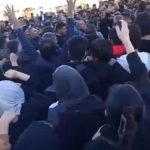
Madrid to Take Control of Catalonia
The Spanish government has announced plans to impose direct rule on Catalonia following the region’s banned vote on independence earlier this month.
The announcement came just minutes after separatist leader Carles Puigdemont threatened to declare independence if Madrid fails to engage in dialogue.
For the first time ever, the Spanish government will invoke Article 155.
Article 155 gives Madrid the power to “take all measures necessary to compel” a community that “does not fulfill the obligations imposed upon it by the constitution or other laws, or acts in a way that is seriously prejudicial to the general interest of Spain.”
The provision gives Prime Minister Rajoy the power to force new elections, operate institutions, and replace local law enforcement.
“Pro-independence activists in Catalonia went into rushed meetings Thursday to organize mass demonstrations, distribute instructions for peaceful civil disobedience, and plan to surround government buildings,” reports The Washington Post.
This rapid succession of events has exacerbated what is already being viewed as one of the worst crises in Spain’s relatively young democracy.
Rajoy and his cabinet will meet this weekend to draw up a list of specific measures under Article 155, beginning the transfer of power from Catalonia to the central government. They could also choose to arrest Puigdemont, but such a move threatens to incite more protests.
Roughly 200,000 people took to the streets of Barcelona on Tuesday to protest the arrest of two separatist leaders who were locked up on sedition charges.
For Prime Minister Rajoy, the challenge will be to uphold the rule of law while minimizing the risk of protests and riots. In the words of Spanish lawmaker Pablo Iglesias, “We don’t want to threaten or repress Catalonia, but we want to convince Catalonia that Spain is a collective project that is worth it.”
For Puigdemont and the separatists it’s about getting something they feel they already deserve. Catalonia is a rich region of 7 million people. It has its own language and its own culture.
“Despite all our efforts and our will for dialogue, the fact that your only answer is canceling our autonomy indicated that you do not understand the problem and do not wish to talk,” wrote Puigdemont, adding that his independence declaration remained suspended for the time being. “If the government continues to impede dialogue and continues with the repression, the Catalan parliament could proceed, if it is considered opportune, to vote on a formal declaration of independence.”
Less than 50% Catalan voters participated in the referendum on October 1st. The separatists have blamed low voter turnout on Madrid’s efforts to stop the vote, while the government insists that those who did not vote do not support independence.
Either way, the vote has exposed a tremendous rift between those who support independence and those who wish to remain a part of Spain. Hundreds of businesses have already moved their headquarters out of Catalonia.
Madrid will have support from the EU as it tries to bring Catalonia to heel. “We are monitoring the situation very closely and support the position of the Spanish government which is also a cross-party position,” said German Chancellor Angela Merkel. “Of course this is concerning and we hope there are solutions here which are based on the Spanish constitution.”
Puigdemont will have the right to reply after Madrid finalizes its list of measures. There is no window of time for him to do so, so we can expect the process to take days – or even weeks. The measures will then have to be approved by the Senate, where Rajoy’s Popular Party (PP) currently holds majority.



























Compared to whom? It’s your commiecrat party who hates Jews.
Obviously you and the ignoramus who likes to use the word faggot can’t read. My point was that the leaders…
COMMENT🤣 NO SH*T!
Mike f as in faggot you are the demented one if you think tampon Tim is a hero. You must…
Check another one from the enemy list. Slow news day? Trying to divert from murderous Minnesota?